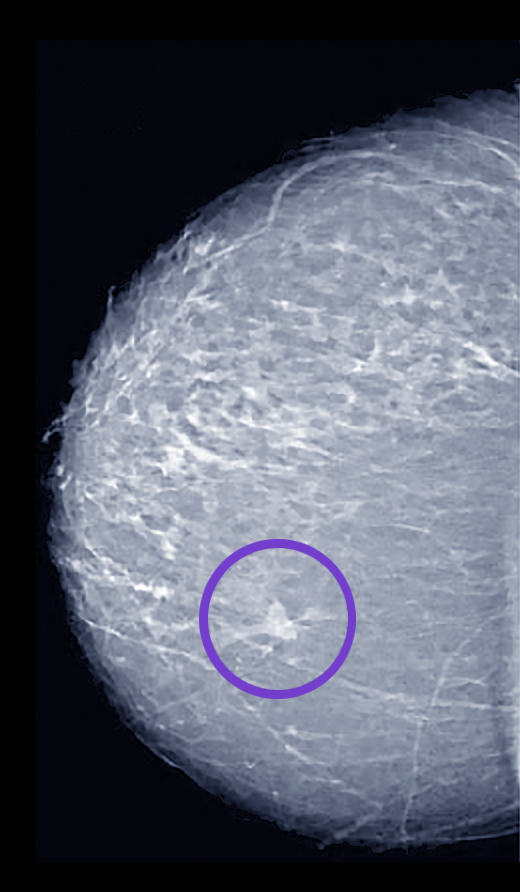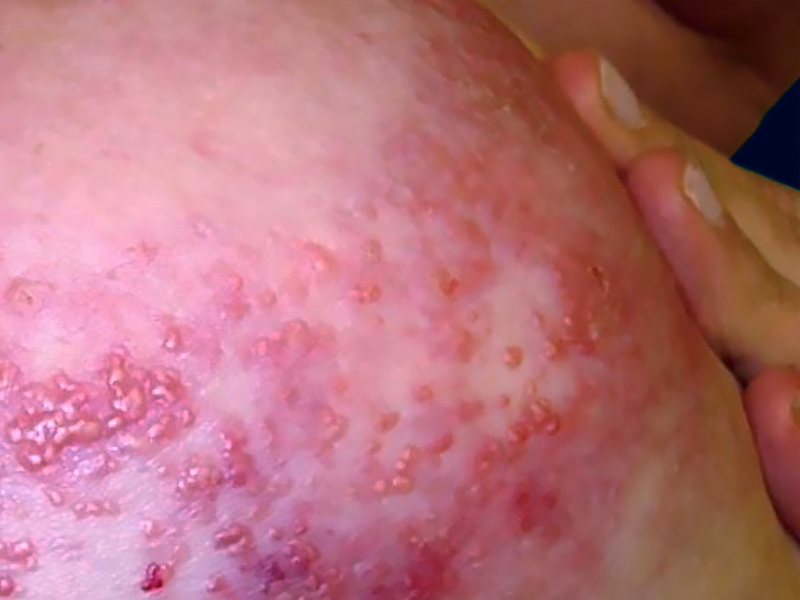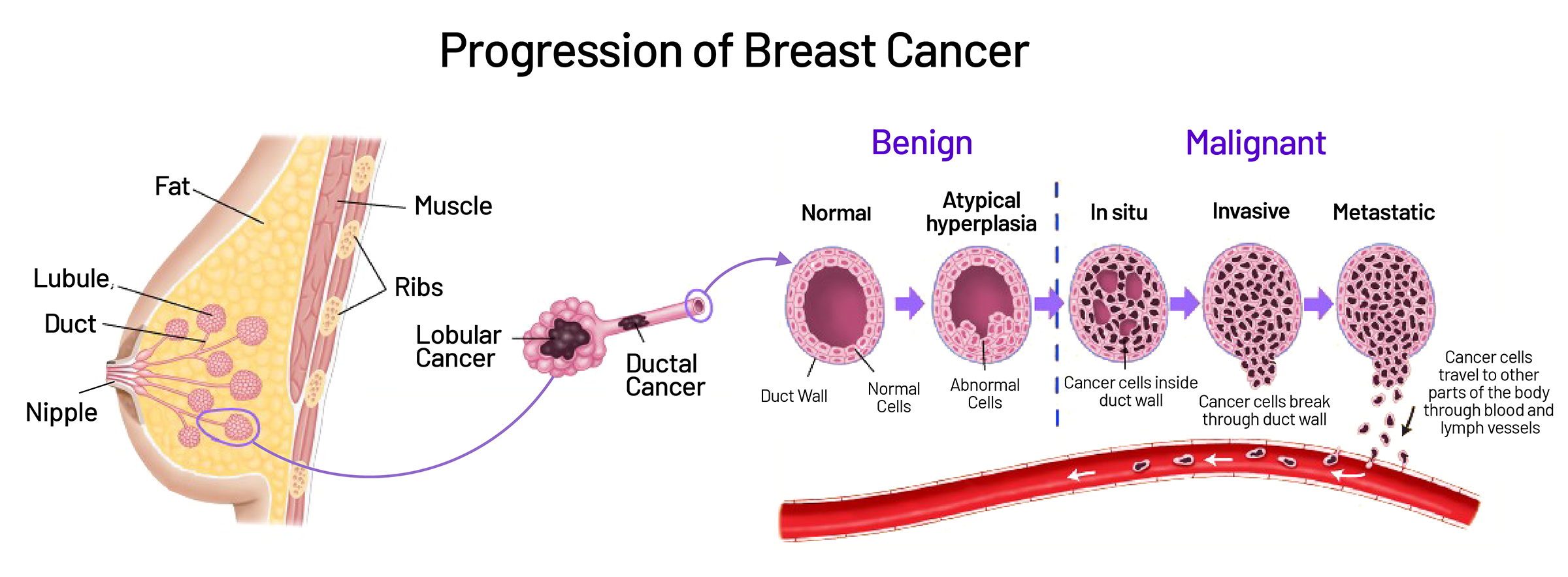The Margie Petersen Breast Center provides a variety of services from routine examination to oncologic treatment, starting with our breast clinic. We can determine benign (non-cancerous) and malignant (cancerous) conditions and develop highly effective treatment plans supported by a multi-disciplinary team.

If you are diagnosed with breast cancer, additional tests may be needed to determine the type of breast cancer and stage, including if the cancer has spread to other parts of the body.
Women can take a proactive role in their breast health by conducting self examinations and our physicians can confirm results with a clinical breast exam. Proudly, we can diagnose any breast condition in one day.
What are the Main Types of Breast Cancer?
Breast cancer is a diverse group of diseases with several distinct types, each with its own characteristics and behaviors. No two persons will have the exact same breast cancer profile because the cancer is derived from each person’s unique genetic mutation.
Each type of breast cancer may require different approaches to diagnosis, treatment, and management, so it’s crucial for patients to work closely with their healthcare team to develop a personalized treatment plan tailored to their specific condition. Early detection through regular screenings and awareness of breast cancer risk factors can also play a significant role in improving outcomes.
What is Ductal Carcinoma In Situ (DCIS)?
Ductal Carcinoma In Situ (DCIS) is considered the earliest form of breast cancer. DCIS is a non-invasive breast cancer where abnormal cells are found in the lining of a breast duct but have not spread outside the duct. It is often considered a precancerous condition.It is often detected during routine mammograms before any symptoms appear. This is why regular screening is crucial.
The prognosis for DCIS is generally favorable, with high survival rates due to its early detection and effective treatment options. However, untreated DCIS can potentially develop into invasive breast cancer, so timely treatment is essential.

What is Invasive Ductal Carcinoma (IDC)?
Invasive Ductal Carcinoma (IDC) is the most common type of breast cancer. IDC begins in the milk ducts but then breaks through the duct wall and invades the surrounding breast tissue. It can also spread to other parts of the body if left untreated. This is why it is referred to as invasive.
IDC is often detected through mammograms or physical exams, sometimes presenting as a lump in the breast. Symptoms can include changes in breast shape, skin dimpling, or nipple discharge.
What is Invasive Lobular Carcinoma?
Invasive Lobular Carcinoma (ILC) originates in the lobules, which is the milk-producing glands of the breast. It has a tendency to spread in a single-file pattern, making it harder to detect through mammograms and potentially more challenging to treat. Symptoms might include thickening of an area in the breast, fullness, or changes in breast texture rather than a distinct lump.
What is Invasive Mucinous Carcinoma?
Invasive Mucinous Carcinoma is a rare subtype of Invasive Ductal Carcinoma that is characterized by the presence of mucus-producing cancer cells. It tends to be less aggressive and is less likely to spread to the lymph nodes. Invasive mucinous carcinoma can be detected through mammograms or physical exams. It often presents as a soft, well-defined mass. Because of its mucin content, it may appear differently on imaging studies compared to other breast cancers.
What is Inflammatory Breast Cancer?
Inflammatory Breast Cancer (IBC) is a rare but aggressive form of breast cancer that usually presents with reddening and swelling of the skin rather than a distinctive mass. This type of breast cancer only accounts for 1% of all breast cancer cases in the United States. It is called inflammatory because the affected breast often appears swollen, and red, and feels warm to the touch. IBC tends to grow and spread quickly, making early diagnosis and aggressive treatment essential.
What is Metastatic Breast Cancer?
Metastatic Breast Cancer occurs when cancer cells have spread beyond the breast and nearby lymph nodes to other parts of the body (stage IV breast cancer). The common areas of metastasis are the brain, liver, bones, and lungs. Breast cancer cells spread from the original tumor through the bloodstream and the lymphatic system. Metastatic Breast Cance is considered advanced and may not be curable, but it can be managed with various treatments to extend life and improve quality of life.
Signs and Symptoms of Breast Cancer
While some types of breast cancers may have specific symptoms, most share similar symptoms. Therefore, it is highly recommended to see a specialist when changes occur. Most women notice changes as they happen and can articulate how quickly they evovle. This information is important for your provider to know.
Common signs and symptoms shared across breast cancers include:
- Lump or Thickening in the Breast or Underarm – Most common in IDC and ILC
- Changes in Breast Shape or Size – Affected by tumor growth, size, or tissue changes.
- Nipple Changes – Retraction, inversion, or discharge.
- Skin Changes – Redness, dimpling, or texture changes.
- Pain or Tenderness – Usually in later stages, though some types (like IBC) can be painful earlier.
Specific Symptoms of Breast Cancer
Invasive Ductal Carcinoma (IDC) is the most common involving approximately 80% of invasive cases, a hard, palpable lump with irregular edges can be felt by touch. This type of cancer is more likely to cause visible distortion or thickening in the breast tissue. If not detected and treated early, IDC can metastasize to nearby lymph nodes.
Invasive Lobular Carcinoma (ILC), which comprises 10 to 15% of invasive cases, can presents as a subtle thickening rather than a distinct lump. When manipulated gently, it can cause a pulling sensation or an area of fullness rather than a hard mass. ILC may involve both breasts (bilateral), which is more common than IDC.
Mucinous (Colloid) Carcinoma is a rare form of invasive breast cancers(2 to 3%). It is described as a soft, well-defined lump, unlike IDC, which is often firm. Mucinous Carcinomas are slow-growing and less likely to spread to lymph nodes. It is also less likely to cause skin or nipple changes compared to IDC and ILC.
Inflammatory Breast Cancer (IBC) is also rare and aggressive, about 1 to 5% of cases. Rapid swelling can be felt including redness and warmth of the breast, which can be mistaken for an infection. Dimpling of the skin resembling an orange peel is also visible while there is no distinct lump because the cancer cells can block lymphatic vessels. Pain and tenderness are also preminent and often an early symptom.
In summary, IDC and ILC often present with a mass but differ in feel (hard lump vs. thickening). Mucinous carcinoma is softer and slower-growing. IBC lacks a lump but has distinct skin changes and rapid progression. Contact a provider for screening and tests if changes in the breast are observed.
How does Breast Cancer Develop?
Breast cancer develops because of several interdependent factors including genetic, hormonal, and environmental. It typically begins when normal cells in the breast tissue mutate causing them to divide and grow uncontrollably. While the causes of these mutations may not be identifiable, several risk factors have been well established. These include a family history of breast cancer, certain inherited gene mutations (such as BRCA1 and BRCA2), hormonal influences (estrogen and progesterone), exposure to ionizing radiation, and lifestyle factors like excessive alcohol consumption, smoking, and obesity.
As these mutated cells continue to divide and accumulate, they can form a mass or lump in the breast also known as a tumor. Some breast tumors are benign, meaning they are not cancerous and do not spread to other parts of the body.
However, other tumors can be malignant, or cancerous, and have the potential to invade surrounding tissues (metastasis), spreading to other organs through the bloodstream or the lymphatic system. The stage and aggressiveness of breast cancer can vary. Therefore, early detection through regular screening, including regular mammograms, is crucial for effective treatment and improved outcomes. Treatment options for breast cancer may include surgery, radiation therapy, chemotherapy, hormone therapy, targeted therapy, or a combination of these, depending on the type and stage of the cancer.
FAQs about Types of Breast Cancer
What is the most aggressive type of breast cancer
The most aggressive type of breast cancer is triple-negative breast cancer (TNBC). Unlike other forms, TNBC lacks estrogen receptors, progesterone receptors, and excess HER2 protein, making it unresponsive to hormonal therapy and HER2-targeted treatments.
Key Characteristics:
- TNBC tends to grow and spread more quickly than other types of breast cancer.
- It is more likely to recur after treatment.
- Commonly diagnosed in younger women, particularly those under 40, and is more prevalent in African American and Hispanic women.
Treatment and Prognosis:
- Due to its aggressive nature, treatment often involves a combination of surgery, chemotherapy, and radiation.
- Prognosis is generally poorer compared to other breast cancer types, but early detection and aggressive treatment can improve outcomes.
What type of breast cancer is most likely to metastasize?
The type of breast cancer most likely to metastasize is invasive ductal carcinoma (IDC), the most common form of breast cancer. IDC starts in the milk ducts and can spread to surrounding breast tissue and beyond.
- IDC is the most frequently diagnosed breast cancer, accounting for about 80% of all cases.
- It has a higher likelihood of spreading to lymph nodes and distant organs, such as the liver, lungs, bones, and brain.
- Triple-negative breast cancer (TNBC), a subtype of IDC, is particularly aggressive and prone to metastasis due to its lack of hormone receptors and HER2 protein, making it less responsive to standard treatments.
Management and Monitoring:
- Regular follow-ups and imaging tests are crucial for early detection of metastasis.
- Treatment plans often include a combination of surgery, chemotherapy, radiation, and targeted therapies to manage and reduce the risk of spread.
Early detection and comprehensive treatment can improve outcomes and survival rates for patients with metastatic breast cancer. Always discuss any concerns with your healthcare provider for personalized advice
What Is Hormone Receptor Positive Breast Cancer?
Hormone receptor-positive breast cancer is a type of breast cancer that grows in response to hormones. This form of cancer has cells with receptors for estrogen (ER) and/or progesterone (PR).
Key Characteristics:
- Hormone receptor-positive cancers account for about 70% of all breast cancer cases.
- These cancers tend to grow more slowly than hormone receptor-negative cancers.
- They are more likely to respond to hormonal therapies, such as tamoxifen or aromatase inhibitors, which block the cancer’s access to the hormones it needs to grow.
Treatment and Prognosis:
- Treatment options include surgery, radiation, chemotherapy, and hormone therapy.
- Hormone therapy helps prevent the cancer from returning by blocking the body’s hormone production or by blocking the hormones from attaching to the receptors.
- Patients with hormone receptor-positive breast cancer often have a better prognosis due to the effectiveness of hormone therapies.
What Is Hormone Receptor Negative Breast Cancer?
Hormone receptor-negative breast cancer does not have receptors for estrogen (ER) or progesterone (PR), meaning it does not rely on these hormones to grow.
Key Characteristics:
- This type of breast cancer accounts for about 20-30% of all breast cancer cases.
- Hormone receptor-negative cancers tend to grow and spread more quickly than hormone receptor-positive cancers.
- These cancers do not respond to hormonal therapies like tamoxifen or aromatase inhibitors.
Treatment and Prognosis:
- Treatment typically includes a combination of surgery, chemotherapy, and radiation.
- Targeted therapies may be an option if the cancer is also HER2-positive.
- Prognosis can be less favorable compared to hormone receptor-positive cancers due to the lack of targeted hormonal treatments.
Early detection and aggressive treatment are crucial for managing hormone receptor-negative breast cancer.
What stage of breast cancer requires a mastectomy?
A mastectomy, the surgical removal of the entire breast, is considered at various stages of breast cancer, depending on specific circumstances. At Margie Petersen Breast Center at Providence Saint John’s Health Center, we aim to preserve and reconstruct as much breast tissue as possible, factoring data-driven outcomes and the future potential of metastasis.
Key Factors:
- Stage I and II: Early-stage breast cancer may require a mastectomy if the tumor is large relative to breast size, there are multiple tumors, or previous treatments failed.
- Stage III: This stage often involves larger tumors or extensive lymph node involvement. A mastectomy is common, followed by chemotherapy or radiation.
- Stage IV: Though rare, a mastectomy might be recommended to control symptoms or prevent complications from metastatic breast cancer.
Additional Considerations:
- Some patients with a high genetic risk for cancer, like BRCA mutations, may opt for a prophylactic mastectomy to reduce risk.
- Inflammatory breast cancer, an aggressive form, frequently requires a mastectomy as part of comprehensive treatment.
- Bring previous mammogram images for comparison.
- Discuss any breast symptoms or concerns with the technician before starting.
- Plan to arrive early to complete any necessary paperwork.
Contact the Margie Petersen Breast Center to Schedule a Breast Examination

The Margie Petersen Breast Center at Providence Saint John’s Health Center is widely renowned for its outstanding and compassionate patient care, expert surgical and medical team, and ability to evaluate any breast condition in one day fully.
Meet Our Breast Health Experts
The Breast Health Clinic can be reached at (310) 582-7209. If you have questions regarding a new symptom or want to make an appointment for evaluation please call and a staff member will assist with navigating you in the right direction.
Schedule an Appointment For more information







